自考英语二unit 1
自考英语二-Unit-1--the-language-of-confidence
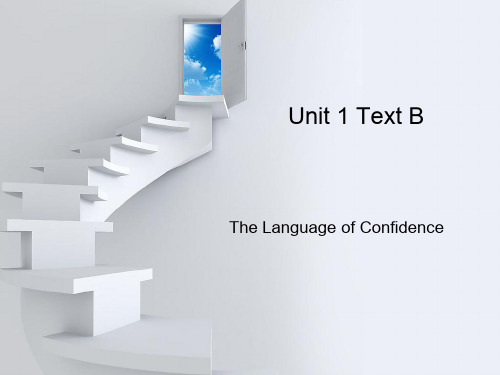
衍生:பைடு நூலகம்ualify
v. have or give(sb) the qualities, training, etc. that are necessary or suitable(for sth)
(使)(某人)具有资格;给(某人)某种资格;(使)合格
eg: I won't qualify until next year. 我明年才具备资格。
qualified
adj. having completed the relevant training or examination
经过训练或考试的;有资格的;合格的;及格的
eg: 合格的医生
a qualified doctor
Page 4
subconscious
adj. connected with feelings that influence your behavior even though you are not aware of them 下意识的;潜意识的
(他来也好去也好)那有什么关系? 你做什么我都无所谓。 It doesn't matter to me what you do.
Page 6
sense
n. 感觉,官能;意识,观念;理性;识别力 eg.a keen sense of smell. 灵敏的嗅觉
vt. 感到;理解,领会;检测出 eg.She probably sensed that I wasn't telling her the whole story. 她可能意识到了我并没有对她全盘托出。 意识;观念 sense of humor 幽默感 sense of urgency 急迫感 sense of security 安全感 好处;意义 There's no sense in pretending this doesn't happen. 假装这件事没有发生毫无意义。 What you said does not make sense. 你所说的没有任何意义。
自考英语二unit 1 The Power of Language

单词 20次 记单词的方法 6 多讲单词 10 少讲单词 1 讲慢点 18 讲语法 14 少讲语法 1 基础差 10 说汉语 9 英汉夹杂 4 多说英语 1 阅读 1 翻译 2 口语 2 听力 5 大声 3 学习方法 4 多交流 1 音标 2 不提问 2 风趣 1 针对考试 1 补充课外知识 1 难度 1 无 7
INFORM
inform sb. of/about sth. Please inform us of any changes of address. 地址若有变动请随时通知我们。 informed adj. (1)有学问的;有见识的 (2)(消息来源)可靠的,有根据的 According to informed sources 据可靠消息
Assumptions are |whatever the author must believe is true in order to make assertions.
假设指的是作者为了提出其论断必须相信是正确的 那些观点。 What is written |may very well reflect a biased position.
HOMEWORK
P109 Ⅱ Section A B C P111 Ⅲ P111 Ⅳ学有余力者做
ASSUMPTION
n. 假设,假定 make an assumption His actions were based on a false assumption. 他的行为基于错误的设想。
CASE
n.(1)情况:in some cases If that is the case如果真是那样; in case of sth. 如果 (just) in case (…)以防;以防万一 (2)案件 :a murder case谋杀案;to win/lose a case 胜 / 败诉 (3) 容器:a jewelry case首饰盒;suitcase手提箱 (4)病例
自考英语二Unit 1 The Power of Language
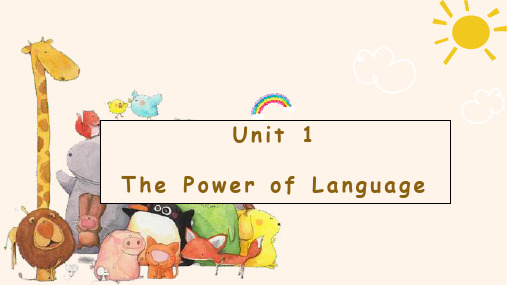
6. evaluate /ɪˈvæ ljueɪt/ v. 估计;评价;评估 7. context /ˈkɒntekst/ n. 事情发生的背景,环境,来龙去脉
8. value /ˈvæ ljuː/ n. 是非标准;价值观
Unit 1 The Power of Language
I. New words and expressions on Text A
II. Text A Critical Reading
教 学 III. Exercises on Text A
目标
IV. New words and expressions on Text B V. Text B The Language of Confidence
made lasting持久的 contributions to English literature as a poet诗人,
essayist /ˈeseɪɪst/散文家, moralist /ˈmɒrəlɪst/道德家, literary critic文学评论家 , biographer传记作家, editor编纂者 and lexicographer /ˌleksɪˈkɒɡrəfə(r)/ 词典 编纂者. Johnson has been described as “arguably /ˈɑːɡjuəbli/正如可提出证据加 以证明的那样地 the most distinguished最杰出的 man of letters in English history.”
considerable /kənˈsɪdərəbl/ adj. 相当大的;重要的,值得考虑的 considerate /kənˈsɪdərət/ adj. 体贴的;体谅的;考虑周到的 consideration /kənˌsɪdəˈreɪʃn/ n. 考虑;原因;关心;报酬 31. Democrat /ˈdeməkræ t/ n. (美国) 民主党党员/民主党支持者民 32. Republican /ri'pʌblikən/ n. (美国)共和党党员,共和党支持者 33. reflect /rɪˈflekt/ v. 显示;表明;表达 34. informed /ɪnˈfɔːmd/ adj. 有学问的;有见识的 well-informed /ˌwel ɪnˈfɔːmd/
自学考试00015英语(二)Unit 1课文

(3)In either case, you must recognize and take into account any differences between your values and attitudes and those represented by the author.
those是代词,代替前面的复数名词values and attitudes。
⑦ Identify any possible author bias. (6)A written discussion of American politics will likely look considerably different depending on whether the writer is a Democrat or a Republican.
A. of
B. in
C. at
D. with
【答案】D 【解析】本题考查consist的用法。consist of意为"由…… 组成";consist in意为"在于";consist with意为"与……一 致",故选D。consist at不存在。该句的意思是"说实话, 我真希望这次你的言行能一致"
9. represent v. 描述;表现 representative adj./n. 10. assertion n. 明确肯定;断言 11. sufficient adj. 足够的;充足的
Sufficiency insufficient
12. statistic n. statistics [pl.]统计数字;统计资料 13. integrate v.(使)合并,成为一体
自考英语二(新版)原文Unit1ThePowerofLanguage
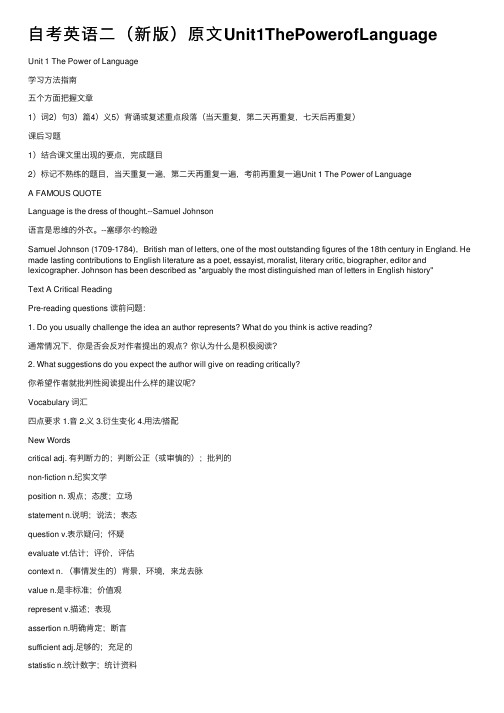
⾃考英语⼆(新版)原⽂Unit1ThePowerofLanguageUnit 1 The Power of Language学习⽅法指南五个⽅⾯把握⽂章1)词2)句3)篇4)义5)背诵或复述重点段落(当天重复,第⼆天再重复,七天后再重复)课后习题1)结合课⽂⾥出现的要点,完成题⽬2)标记不熟练的题⽬,当天重复⼀遍,第⼆天再重复⼀遍,考前再重复⼀遍Unit 1 The Power of LanguageA FAMOUS QUOTELanguage is the dress of thought.--Samuel Johnson语⾔是思维的外⾐。
--塞缪尔·约翰逊Samuel Johnson (1709-1784),British man of letters, one of the most outstanding figures of the 18th century in England. He made lasting contributions to English literature as a poet, essayist, moralist, literary critic, biographer, editor and lexicographer. Johnson has been described as "arguably the most distinguished man of letters in English history"Text A Critical ReadingPre-reading questions 读前问题:1. Do you usually challenge the idea an author represents? What do you think is active reading?通常情况下,你是否会反对作者提出的观点?你认为什么是积极阅读?2. What suggestions do you expect the author will give on reading critically?你希望作者就批判性阅读提出什么样的建议呢?Vocabulary 词汇四点要求 1.⾳ 2.义 3.衍⽣变化 4.⽤法/搭配New Wordscritical adj. 有判断⼒的;判断公正(或审慎的);批判的non-fiction n.纪实⽂学position n. 观点;态度;⽴场statement n.说明;说法;表态question v.表⽰疑问;怀疑evaluate vt.估计;评价,评估context n. (事情发⽣的)背景,环境,来龙去脉value n.是⾮标准;价值观represent v.描述;表现assertion n.明确肯定;断⾔sufficient adj.⾜够的;充⾜的statistic n.统计数字;统计资料integrate v.(使)合并,成为⼀体authority n. 专家;学术权威;泰⽃compare v.⽐较;对⽐subject n.主题;题⽬;题材consistent adj. 相符的;符合的(consistency)inconsistency n.不⼀致assumption n.假定;假设case n. 具体情况;事例directly adv. 直接地;径直地identify v. 找到;发现valid adj. 符合逻辑的;合理的;确凿的credible adj. 可信的;可靠的landmark n.(标志重要阶段的)⾥程碑;地标relevant adj.紧密相关的;切题的current adj. 现时发⽣的;当前的appropriate adj.合适的;恰当的bias n.偏见;偏⼼;偏向considerably adv. ⾮常;很;相当多地Democrat n.(美国)民主党党员,民主党⽀持者Republican n.(美国)共和党党员,共和党⽀持者reflect v.显⽰;表明;表达informed adj.有学问的;有见识的Phrases and Expressionsapply to使⽤;适⽤于put forth 提出;产⽣take sth into account 考虑;顾及accept/take sth at face value 相信表⾯;信以为真with a grain of salt 有保留地;持怀疑态度地重点词汇critical adj. 有判断⼒的;判断公正(或审慎的)eg: Try to develop a more critical attitude, instead of accepting everything at face value. 要学会对⼀切事物⼀丝不苟, ⽽不要注重表⾯现象.其他⽤法:危机中的;危急时刻的;决定性的;关键的eg: We are at a critical time in our history.我们正处于历史的紧要关头。
自考英语二(00015)Unit1-TextB 课文

command v. 命令,指挥;控制 n. 指挥,控制;司令部 commander 指挥官;司令官 commandment 戒律;法令 commandant 司令官,指挥官;军事学校的校长 eg. 他命令士兵们把大门关上。 He commanded the soldiers to shut the gate. knowingly adv. 故意地;机警地,狡黠地 近义词:intentionally knowing adj. 博学的;狡猾的;心照不宣的 n. 认知 eg. 我们不知道政府有没有故意或蓄意地掩盖事实。 We did not know that whether the government knowingly or consciously choose to cover the truth.
1. a great degree of 很大程度上的 eg. All these are valid reasons for a very great degree of freedom. 所有这些都是要求高度自由的合理原因。 2. mastery n. 掌握,掌控 eg.Science offers us total mastery over environment and over our destiny. 科学给了我们对环境自身命运很大的掌控权。 He doesn’t have mastery of the basic rules of grammar. 他没有掌握语法的基本规则。
自考英语二(00015)unit1 text A 课文
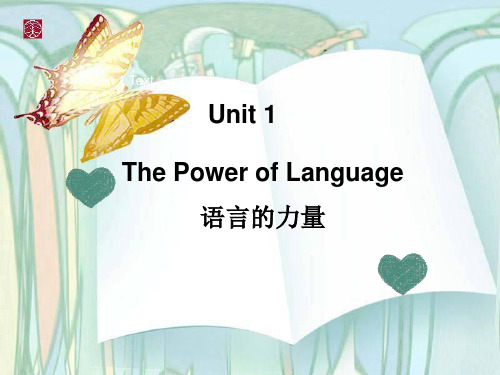
Pre-reading Questions
1. Do you usually challenge the idea an author represents? What do you think is active reading?
通常情况下,你是否会反对作者提出的观点?你认为 什么是积极阅读?
Making Suggestions
Steve: Hi, Jenny, would you like to do something with me this weekend? Jenny: Sure. What shall we do? Steve: I don't know. Do you have any ideas? Jenny: Why don't we see a film? Steve:That sounds good to me. Which film shall we see? Jenny: Let's see Action Man 4.
史蒂夫:8点在瑞克斯影院。看电 影之前我们吃点东西怎么样?
Jenny: Sure, that sounds great. What about going to that new Italian restaurant Michetti's?
珍妮:当然了,好主意。去新开 的意大利餐馆梅开缇吧。
Steve: Great idea! Let's meet there 史蒂夫:太好了! 6点钟在那不见
史蒂夫:我不想看那部电影,我 不喜欢看充满暴力的影片。《疯 狂的布朗医生》怎么样?听说很 有趣。
quite a funny film.
Jenny: OK. Let's go see that. When 珍妮:好的。就看这部吧!几点
自考英语二Unit-1--The-Power-of-Language--翻译
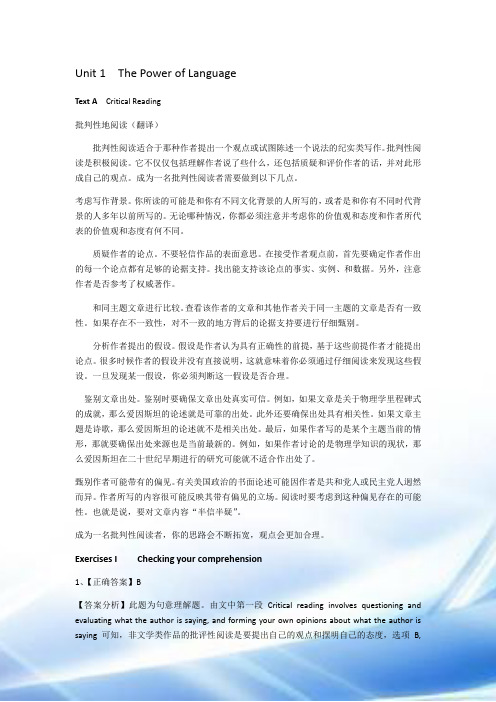
Unit 1 The Power of LanguageText A Critical Reading批判性地阅读(翻译)批判性阅读适合于那种作者提出一个观点或试图陈述一个说法的纪实类写作。
批判性阅读是积极阅读。
它不仅仅包括理解作者说了些什么,还包括质疑和评价作者的话,并对此形成自己的观点。
成为一名批判性阅读者需要做到以下几点。
考虑写作背景。
你所读的可能是和你有不同文化背景的人所写的,或者是和你有不同时代背景的人多年以前所写的。
无论哪种情况,你都必须注意并考虑你的价值观和态度和作者所代表的价值观和态度有何不同。
质疑作者的论点。
不要轻信作品的表面意思。
在接受作者观点前,首先要确定作者作出的每一个论点都有足够的论据支持。
找出能支持该论点的事实、实例、和数据。
另外,注意作者是否参考了权威著作。
和同主题文章进行比较。
查看该作者的文章和其他作者关于同一主题的文章是否有一致性。
如果存在不一致性,对不一致的地方背后的论据支持要进行仔细甄别。
分析作者提出的假设。
假设是作者认为具有正确性的前提,基于这些前提作者才能提出论点。
很多时候作者的假设并没有直接说明,这就意味着你必须通过仔细阅读来发现这些假设。
一旦发现某一假设,你必须判断这一假设是否合理。
鉴别文章出处。
鉴别时要确保文章出处真实可信。
例如,如果文章是关于物理学里程碑式的成就,那么爱因斯坦的论述就是可靠的出处。
此外还要确保出处具有相关性。
如果文章主题是诗歌,那么爱因斯坦的论述就不是相关出处。
最后,如果作者写的是某个主题当前的情形,那就要确保出处来源也是当前最新的。
例如,如果作者讨论的是物理学知识的现状,那么爱因斯坦在二十世纪早期进行的研究可能就不适合作出处了。
甄别作者可能带有的偏见。
有关美国政治的书面论述可能因作者是共和党人或民主党人迥然而异。
作者所写的内容很可能反映其带有偏见的立场。
阅读时要考虑到这种偏见存在的可能性。
也就是说,要对文章内容“半信半疑”。
成为一名批判性阅读者,你的思路会不断拓宽,观点会更加合理。
自考英语二unit 1
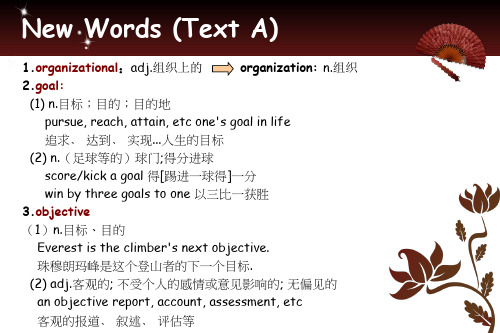
Phrases & Expressions
• in the way e.g I will visit you on Sunday,if there is nothing in the way. 如果没有什么妨碍的话,我将在星期日去拜访你。 Mary tried to clean the house, but her baby got in the way. 玛丽想打扫房子,可是她的孩子总是碍手碍脚的。 • and the like= and so on • to seek to e.g Local schools are seeking to reduce the dropout rate. 当地学校正在争取降低失学率。 • in part= partly e.g His success is in part owing to luck.他的成功在某种程度上是由于走运。 It is in part your own fault that you have failed. 你的失败有一部分是你自己的过错造成的。
New Words
4.accomplish: accomplish 常接 task, aim, journey, voyage 等名词, 有时兼有“达成(效果)” 之意。 如:The explorers accomplished the voyage in five weeks. 探险队在五周内完成了航程。 与finish, complete 的区别: complete 比 accomplish 具体, 可接建筑、工程、书籍等名词, 指“按预期目的 把未完成的工作经过进一步的努力使之完成”, 主要涵义是“补足缺少的部分 ”, 如:The building will be completed by the end of this month. 这座楼于本月底建成。 finish 在许多情况下可与 complete 换用, 但没 complete 正式,常含有“认真仔 细地完成工作的最后阶 段的精工修饰, 使之完美”的意思。 如:I have finished the book. 我已读完了这本书。
自考英语二(00015)Unit1-TextB 练习题

2.1 know you don't think that this project is important, ________ _b_u__t _it_m__a_t_te_r_s_t_o__m_e___ (但这对我很重要). (matter)
3. There were some violence after the match, _b_u_t_t_h_e_p__o_li_c_e_w_e_r_e_ _s_o_o_n_i_n_c_o_n_t_r_o_l_o_f_t_h_e_s_i_tu_a_t_i_o_n_(但是没过多久警方就控制住了局 势). (in control of) 4. I'm afraid _I_h_a_v_e__n_o_a_l_te_r_n_a_t_i_v_e_b_u_t_t_o_a_s_k__y_o_u_t_o__le_a_v_e_ (除了 让你走,我别无选择). (no alternative but) 5. _I_t_’s__u_p_t_o__th_e__m_a_n_a_g_e_r__to___(经理会作最终决定)! (be up to)
3. A move towards healthy eating could help _e_li_m_i_n_a_t_e heart disease. (eliminate, elimination)
自考英语二 课后练习答案 Unit 1 课后习题答案

Unit l The Power of Language课后习题参考答案Text AI.1.B 2.A3.D4.A5.CII.Section Al.consistent 2.statement 3.reflect 4.invalid5.considerablyparisonSection B1.credible2.identify3.assumptions4.represents5.evaluated6.appropriateSection C1.to2.forth3.into4.on5.with6.toⅢ. 1.define 2.action 3.tears 4.good 5.express6.powerful7.internally8.shapes9.responds to10.personal Ⅳ.Section A1.take the interests of different social groups into accountpare the recent work with the previous work3.was not consistent with his statement to the police4.was not relevant to the matter at hand5.Please inform us of any change of your situationSection B要想成为一位“弹性阅读者”,你需要懂得如何选择和使用与你的阅读目的相符的阅读方式。
懂得何时使用以及如何使用各种阅读方式,就能让你成为“弹性阅读者”。
如果一名“弹性阅读者”的阅读目的是对难度较大的材料进行高层次的理解,那么他要使用的阅读方式就是研究式阅读。
使用研究式阅读方式时,你的阅读速度应当比正常速度慢。
并且在阅读当中,你必须激发自己的潜力去理解该材料。
研究式阅读常常需要你阅读材料不止一遍,以获得高层次的理解。
Unit1自考英语二课件
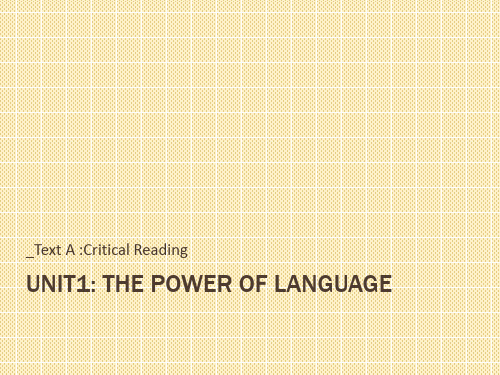
IMPORTANT WORDS
2 apply to 使用;应用 apply to sb./sth.= be applicable to sb./sth. e.g These regulations apply to everyone, without exception. apply to sb for sth: 向某人申请某物 e.g. The student applied to the embassy for a visa. apply的派生词: application, n. 应用;申请;应用程序;敷用 e.g. Did you send up my application? applicant, n. 申请人,申请者;请求者 e.g. This applicant is by far the better than that one. applicable: adj. 可适用的;可应用的;合适的
7. credible adj.that can be believed or trusted 可信的;可靠的 eg: a credible witness/statement/report 可信的证人/陈 词/报道 衍生:-able/ible “可…的,能…的” believable可信的,acceptable 可接受的,desirable值得 要的,accessible可接近,flexible 灵活的 credibility n.quality of being believable 可信性;可靠性 -ability/ibility “可…性”: eg: adaptability 适应能力, dependability 可靠性
2 subconscious adj. 下意识的;潜意识的 eg: the subconscious self 潜意识的自我 衍生:sub- = under 在…之下 subway(地铁), submarine(潜水艇) conscious adj. 知道的;察觉的;注意到的 eg: be conscious of being watched/that one is being watched 察觉有人在监视自己 consciousness n. 意识 eg:attitudes that are deeply ingrained in the English consciousness 深深扎根于英国人意识中的 看法
英语二自学教程 (unit 1-speaking -
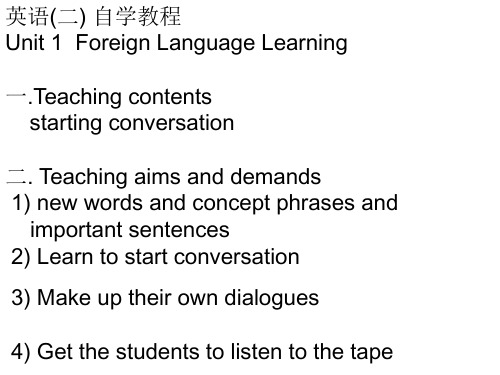
四. Difficulties :
Get the students to make up their own dialogues using the concept phrases ,new words and important sentences .
4. Violent film 暴力电影 5. Mad Doctor Brown 疯狂的布朗博士 6. Quite a funny film 相当有趣的电影
Quite a smart student相当聪明的学生
7. When is it on 上映? 8. That new Italian restaurant Michetti’s . 意大利餐厅米切蒂的餐厅 9. At Michetti’s (restaurant) 在米切蒂的餐厅
3) Make up their own dialogues
4) Get the students to listen to the tape
三. Important points :
1.New words ,concept phrases and important sentences .
2. Get the students to make up their own dialogues using the concept phrases ,new words and important sentences .
六. 表示建议的几种方式 1.Would you like to do --? 2. Shall we do ---? 3. Let’s do --4. Why don’t we /you do ---? 5.How / What about doing ?
新版自考英语二00015教师教案_unit_1_The_Power_of_Language
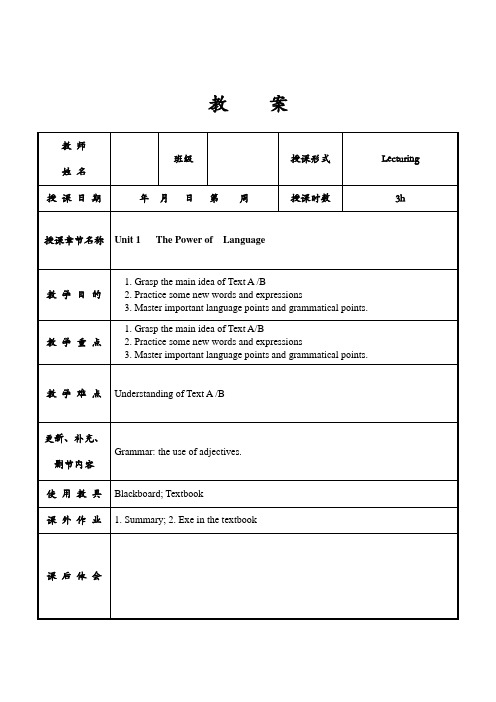
教案授课主要内容说明:教师备课笔记由学校自订式样并附后Unit 1 The Power of Language重点词语Text A1.critical 有判断力的,判断公正(或审慎)的A critical reader will notice many errors in this article.有判断力的读者将会注意到这篇文章里有很多错误。
He made a sound critical estimate of the problem.他对该问题作出了审慎可靠的估计。
2.statement n.说明;说法表态1 could not deny the truth of this statement.我不能否认这种说法的真实性。
Soon afterwards she made her first public statement about the affair. 此事的第一次公开表态。
3.evaluate v.估计;评价;评估The professor was asked to evaluate the current situation.人们请这位教授评估一下当前的形势。
The research project has only been under way for three months, so it, s too early to evaluate its success.这个研究项目进行了不过三个月,所以要对它的成绩作出评价为时尚早。
【近义词辨析】evaluate, estimate, assess, rate这儿个动词都有“评估,评价”之意。
evaluate指仔细考虑以作出评价,特别是有关好坏和用处的评价。
estimate通常指个人作出的主观估价。
assess原义指为确定交多少税而估计,指通过估价以便更好利用。
rate专指评定价值等级的高低。
4.represent v.描述;表现The film intended to represent the lives of ordinary people.这部影片意欲表现普通人的生活。
自考英语二电子版及翻译
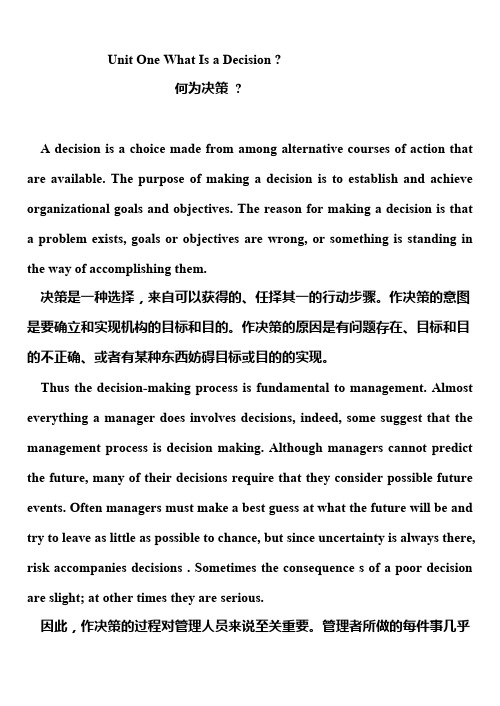
Unit One What Is a Decision ?何为决策? A decision is a choice made from among alternative courses of action that are available. The purpose of making a decision is to establish and achieve organizational goals and objectives. The reason for making a decision is that a problem exists, goals or objectives are wrong, or something is standing in the way of accomplishing them. 决策是一种选择,来自可以获得的、任择其一的行动步骤。
作决策的意图是要确立和实现机构的目标和目的。
作决策的原因是有问题存在、目标和目的不正确、或者有某种东西妨碍目标或目的的实现。
Thus the decision-making process is fundamental to management. Almost everything a manager does involves decisions, indeed, some suggest that the management process is decision making. Although managers cannot predict the future, many of their decisions require that they consider possible future events. Often managers must make a best guess at what the future will be and try to leave as little as possible to chance, but since uncertainty is always there, risk accompanies decisions . Sometimes the consequence s of a poor decision are slight; at other times they are serious. 因此,作决策的过程对管理人员来说至关重要。
自考英语二 Unit 1 the language of confidence
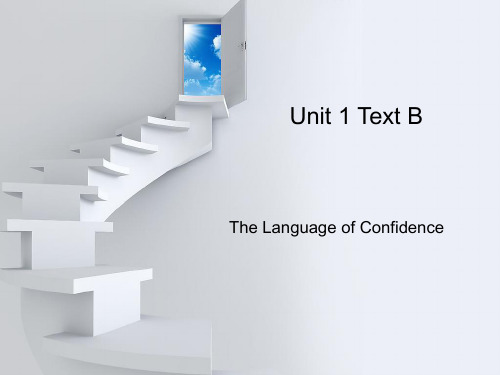
deprive vt. 剥夺,夺去,使丧失
be deprived of e.g They've been deprived of the fuel necessary to heat their homes. 他们没法得到家里取暖所必需的燃料
Page 8
self-esteem [ɪ'sti:m] 自尊心 self-control self-discipline self-study self-assessment self-knowledge
Page 11
YET
表示某事尚未发生 They haven't finished yet.
他们还没有完成。
用于最高级后,表示到目前为止最巩戒最好)迄今为止, 到目前为止
Her latest novel is her best yet.
她的最新小说是她迄今为止最好的一部。 (用于表示仍有可能)还是,仍然 A negotiated settlement might yet be possible. 也许仍有可能通过磋商达成协议。
Page 12
4(用于引出颇令人惊讶的事实)可是却,却又 It is completely waterproof, yet light and comfortable.
它防水性能非常好,但却轻巧舒适。
It is a small word yet it has an amazing impact upon us. 这是个小词但却对我们的影响不可思议。
你所说的没有任何意义。
Page 7
disempower v. to reduce the amount of control that someone has over a situation or over their life 剥夺;使失去权利
自考英语二(新版) 原文 Unit 1 The Power of Language

Unit 1 The Power of LanguageA Famous QuoteLanguage is the dress of thought.------Samuel JohnsonSamuel Johnson(1709-1784), British man of letters, one of the most outstanding figures of the 18th century in England. He made lasting contributions to English literature as a poet, essayist, moralist, literary critic, biographer, editor and lexicographer. Johnson has been described as “arguably the most distinguished man of letters in English history.”Text A Critical ReadingPre-reading Questions1. Do you usually challenge the idea an author represents? What do you think isactive reading?2. What suggestions do you expect the author will give on reading critically?Critical reading applies to non-fiction writing in which the author puts forth a position or seeks to make a statement. Critical reading is active reading. It involves more than just understanding what an author is saying. Critical reading involves questioning and evaluating what the author is saying, and forming your own opinions about what the author is saying. Here are the things you should do to be a critical reader.Consider the context of what is written. You may be reading something that was written by an author from a different cultural context than yours. Or, you may be reading something written sometime ago in a different time context than yours. In either case, you must recognize and take into account any differences between your values and attitudes and those represented by the author.Question assertions made by the author. Don’t accept wha t is written at face value. Before accepting what is written, by certain that the author provides sufficient support for any assertions made. Look for facts, examples, and statistics that provide support. Also, look to see if the author has integrated the work of authorities.Compare what is written with other written work on the subject. Look to see that what is written is consistent with that others have written about the subject. If there are inconsistencies, carefully evaluate the support the author provides for the inconsistencies.Analyze assumptions made by the author. Assumptions are whatever the author must believe is true in order to make assertions. In many cases, the author’s assumptions are not directly stated. This means you must read carefully in order to identify any assumptions. Once you identify an assumption, you must decide whether or not the assumption is valid.Evaluate the sources the author uses. In doing this, by certain that the sources are credible. For example, Einstein is a credible source if the author is writing about landmark achievements in physics. Also be certain that the sources are relevant. Einstein is not a relevant source when the subject is poetry. Finally, if the author is writing about a subject in its current state, be sure that the sources are current. For example, studies done by Einstein in the early 20th century may not be appropriate if the writer is discussing the current state of knowledge in physics.Identify any possible author bias. A written discussion of American politics will likely look considerably different depending on whether the writer is a Democrat or a Republican. What is written may very well reflect a biased position. You need to take this possible bias into account when reading what the author h as written. That is, take what is written with “a grain of salt.”By being a critical reader, you will become better informed and may change your views as appropriate.Text B The Language of ConfidencePre-reading Questions1. Are there any words that make you feel confident or diffident?2. Do you believe that language can influence people’s thought? Give someexample.The language we use programs our brain. Mastering our language give us a great degree of mastery over our lives and our destinies. It is important to use the language in the best way possible in order to dramatically improve our quality of life.Even the smallest of words can have the deepest effect on our subconscious mind, which is like a child, and it doesn’t really understand the difference between what really happens and what you imagine. It is eager to please and willing to carry out any commands that you give it--- whether you do this knowingly or not is entirely up to you.“Try”It is a small word yet it has an amazing impact upon us. If someone says,“I’ll try to do that” you know that they are not going to be putting their whole heart into it, and may not even do it at all. How often do you use the word try when talking about the things that matter to you? Do say “I’ll try to be more confi dent” or “I’ll try to do that” or “I’ll try to call”?Think about something that you would like to achieve, and say it to yourself in two different ways. Firstly say, “I’ll try to …” and notice how you feel. Next say, “I will do …” and see how you feel.Th e latter makes you feel better than the first one, doesn’t it? It gives you a sense of determination, a feeling that it will be done. Listen to the people around you and when they say they will try to notice if it gets done or not. Eliminate the word try from your dictionary and see how your life improves.“Can’t”This is another small word with a big impact. It disempowers us, makes us feel weak and helpless, and damages our self-esteem. It limits our infinite abilities and stifles creativity. Rub it out from your internal dictionary and replace it with something that makes you feel great.Instead of saying you can’t, why not say something like “I choose …” or “I choose not to …” Using words like this allows you to take back your power and to be in control of your life.Words may appear small and insignificant, yet they have a deep and lasting effect on us. Mastering your language gives you the power to live whatever life you desire.What words do you use a lot that disempower you? Make a list of words you commonly use and then write next to them some alternatives you can use. Make these alternatives words that make you feel fabulous, not only about yourself, but about life and what you are doing!。
新版自考英语二00015教师教案_unit_1_The_Power_of_Language

教案教师姓名班级授课形式Lecturing 授课日期年月日第周授课时数3h 授课章节名称Unit 1 The Power of The Power of LanguageLanguage教学目的1.Grasp the main idea of Text A /B 2. Practice some new words and expressions 3.Master important language points and grammatical points. 教学重点1.Grasp the main idea of Text A/B 2. Practice some new words and expressions 3.Master important language points and grammatical points. 教学难点Understanding of Text A /B 更新、补充、删节内容Grammar: the use of adjectives. 使用教具Blackboard; Textbook 课外作业 1. Summary; 2. Exe in the textbook 课后体会授 课 主 要 内 容Step 1 Lead in Discuss the following questions in class. 1. Do you usually challenge the idea an author represents? What do you think is active reading 2.What 2.What suggestions suggestions suggestions do do do you you you expect expect expect the the the author author author will will will give give give on on on reading reading critically Step 2: Text A Part 2. While--Reading Tasks 2.1. Read the new words and expressions 新单词和词组:新单词和词组:critical statement assertion Compare 2.2. Read the Text A and answer the following questions. Step 3 Important expressions analysis Text A 对课文进行细致地分析,包括难句和重要句型句式。
- 1、下载文档前请自行甄别文档内容的完整性,平台不提供额外的编辑、内容补充、找答案等附加服务。
- 2、"仅部分预览"的文档,不可在线预览部分如存在完整性等问题,可反馈申请退款(可完整预览的文档不适用该条件!)。
- 3、如文档侵犯您的权益,请联系客服反馈,我们会尽快为您处理(人工客服工作时间:9:00-18:30)。
New Words
7. implement: vt. put (sth) into effect; carry out implement plans, policies, etc 执行计划﹑ 政策等. 8. constraint:n. ~ (on sth) There are no constraints on your choice of subject for the essay. 文章内容不拘, 你可任选. act under constraint 受逼迫而行动 9. precedent: n. /'presidənt/ create/establish/set a precedent (for sth) (为某事物)开创先例 serve as a precedent for sth 为某事物提供范例 break with precedent打破先例(不按先例行事) president /'prezidənt/总统;总裁;校长;董事长
New Words (Text A)
anizational:adj.组织上的 organization: n.组织 2.goal: (1) n.目标;目的;目的地 pursue, reach, attain, etc one's goal in life 追求﹑ 达到﹑ 实现...人生的目标 (2) n.(足球等的)球门;得分进球 score/kick a goal 得[踢进一球得]一分 win by three goals to one 以三比一获胜 3.objective (1)n.目标、目的 Everest is the climber's next objective. 珠穆朗玛峰是这个登山者的下一个目标. (2) adj.客观的; 不受个人的感情或意见影响的; 无偏见的 an objective report, account, assessment, etc 客观的报道﹑ 叙述﹑ 评估等
6.accompany : (1)+n./+to+n . 伴随、陪同 The guide accompanied the foreign visitors to the airport. (2) +n.+with+n. 与…同时发生或做出 He accompanied his speech with gestures.
11. tendency. n.(pl.-ies) ~ to/toward The tendency is toward higher prices.物价趋向于上涨 I have a tendency to talk too much when I'm nervous. He has a tendency toward music.
New Words
5.predict. vt./vi. 预言;预示 e.g. It is impossible to predict who will win. 要预测出谁将获胜是不可能的。 She predicted that the improvement would continue. 她预测情况将继续好转。 predictable. adj.可预言的; 可预报的 prediction. n.预言; 预报; 预告
New Words
10. simplify. vt(pt, pp -fied) simplify the instructions so that children can understand them. 简化指示便於儿童理解. That will simplify my task. 那可以简化我的工作. simplification. n. 简化; 简化的事物 What she said was a useful simplification of the theory. 她把这一理论讲得深入浅出.
New Words
11. managerial. adj.: relating to the work of a manager. his managerial skills 他的管理能力 a managerial career 管理工作生涯 a managerial error 管理失误 12. achievement. n. They were proud of their childrБайду номын сангаасn's achievements. 他们为自己孩子取得的成就感到自豪。 a sense of achievement 成就感 achieve. vt:通常藉努力﹑ 技巧﹑ 勇气等)获得或达到(某事物); 做成(某事物); 实现; 完成 achieve success, one's ambition 获得成功,实现抱负 I've achieved only half of what I'd hoped to do. 我希望做到的, 我仅完成了一半。
New Words
4.accomplish: accomplish 常接 task, aim, journey, voyage 等名词, 有时兼有“达成(效果)” 之意。 如:The explorers accomplished the voyage in five weeks. 探险队在五周内完成了航程。 与finish, complete 的区别: complete 比 accomplish 具体, 可接建筑、工程、书籍等名词, 指“按预期目的 把未完成的工作经过进一步的努力使之完成”, 主要涵义是“补足缺少的部分 ”, 如:The building will be completed by the end of this month. 这座楼于本月底建成。 finish 在许多情况下可与 complete 换用, 但没 complete 正式,常含有“认真仔 细地完成工作的最后阶 段的精工修饰, 使之完美”的意思。 如:I have finished the book. 我已读完了这本书。
